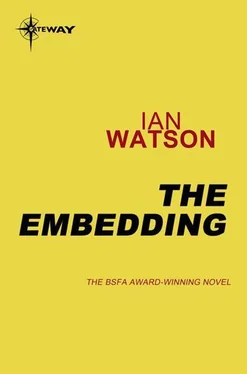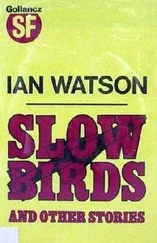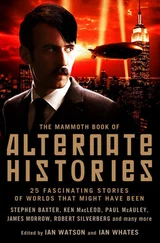Ian Watson - The Embedding
Здесь есть возможность читать онлайн «Ian Watson - The Embedding» весь текст электронной книги совершенно бесплатно (целиком полную версию без сокращений). В некоторых случаях можно слушать аудио, скачать через торрент в формате fb2 и присутствует краткое содержание. Жанр: Фантастика и фэнтези, на английском языке. Описание произведения, (предисловие) а так же отзывы посетителей доступны на портале библиотеки ЛибКат.
- Название:The Embedding
- Автор:
- Жанр:
- Год:неизвестен
- ISBN:нет данных
- Рейтинг книги:4 / 5. Голосов: 1
-
Избранное:Добавить в избранное
- Отзывы:
-
Ваша оценка:
- 80
- 1
- 2
- 3
- 4
- 5
The Embedding: краткое содержание, описание и аннотация
Предлагаем к чтению аннотацию, описание, краткое содержание или предисловие (зависит от того, что написал сам автор книги «The Embedding»). Если вы не нашли необходимую информацию о книге — напишите в комментариях, мы постараемся отыскать её.
The Embedding — читать онлайн бесплатно полную книгу (весь текст) целиком
Ниже представлен текст книги, разбитый по страницам. Система сохранения места последней прочитанной страницы, позволяет с удобством читать онлайн бесплатно книгу «The Embedding», без необходимости каждый раз заново искать на чём Вы остановились. Поставьте закладку, и сможете в любой момент перейти на страницу, на которой закончили чтение.
Интервал:
Закладка:
Charlie glanced at the empty brandy bottle.
“Would you people like another drink? I’ll get a new bottle.” However he made no move to fetch one.
Heinz rose to his feet.
“We must get along to the reception centre before it’s dark. You’ve been kind, Mr Faith. But please don’t ask us how many Indians we expect.” The priest shook his head in a fury of frustration. “That village where the Frenchman was, was the last straw! These Indians simply cannot comprehend. I think they will just sit still and drown! We tried getting through to them with the story of the Flood. Oh, they sat and heard! Then they merely laughed.”
Pomar grasped the older man’s arm sympathetically.
“They will digest it their own way. Surely then they will come out of savagery to safety in their own good time, when the flood has risen some more. And remember, Father, not all the tribes were so awkward as that one.”
“Which is why I didn’t trust the Frenchman! I think he had been tampering with them—polluting them. Why else did they tolerate him, and mock us?”
“Sounds like a rough trip,” Charlie sympathized, though he wasn’t really very interested.
“Oh, it’s so often this way,” grumbled Heinz, pursuing the memory of failure, like a dog hunting a lost bone. “You think you’re making progress. Then you’re swept back to square one. You build somebody up. Then he betrays your trust. You discipline with just reward—and create only a mockery of morals. These Xemahoa Indians weren’t worse than usual. They didn’t use any violence against us. They were just maddeningly different. There was no real communication. This Frenchman could have helped us. But he got excited and refused. After a while he even refused to let his interpreter translate for us. When we tried to reason with him to make him see the need to move these people to the reception centre, he just stared through us, switched on his tape recorder and played some rigmarole in French. Some poetry, he said. But it was nonsense. I couldn’t make head or tail of it. Maybe it was his own obsessive stupidity that appealed to these savages!”
“At least we sowed the seed, Father. God will see to its germinating. Believe me, all the Indians will be trekking this way soon, needing our help.”
“The dam will see to that,” laughed Charlie. “Never mind about God. Give them another couple of weeks, they’ll see there’s no choice. Even your oddball Indians, when they get wet enough.”
In the darkness, studded by sharp stars and sailed in by scudding whale-like clouds, Charlie and Jorge walked down to the cluster of shacks and hovels that straggled away from the tin-roofed homes of Jorge’s staff. Each man carried a torch, flashing it ahead down the wet dirt track. Charlie also had a revolver with him.
Paraffin lamps gleamed from the café and some of the tin homes. A few open fires burned outside the shacks and hovels.
“They ought to be hooked up to our electric supply. I mean our staff ought to be,” muttered Charlie, more sensitive to the darkness since the Captain’s visit.
“There’s a hierarchy of light, Charlie. We see by the electric, those under us by paraffin, those under them by wood and starlight.”
They headed for the café, a rambling structure with screen windows, a dozen tables inside, a kitchen out back and a staircase leading up to a bedroom perched on top of the main structure like a shoebox on top of a suitcase.
A couple of Jorge’s men sat silent over beers. The mulatta woman sat at another table looking dazed, with her Indian friend. Charlie wrinkled his nose as he smelt traces of Lanca Perfume on the hot wet air—the faint reek of scented ether. Jorge and he sat at a vacant table. The slim quiet Indian boy with the squint eye brought them cool beers from the paraffin icebox in back. They smoked.
After a while, Jorge nodded to the two women, who stood up unsteadily, and walked over to their table. Jorge’s workmen looked on impassively. Out in the jungle, something started to scream. Some animal or bird.
The mulatta fumbled in her bag for the small gilt perfume spray with the compressed ether in it. She offered it doubtfully to Charlie. Charlie shook his head. Jorge also refused, swallowed his beer. The woman took a crumpled handkerchief out of her bag and sprayed some ether on it, pressed it tight to her nose and inhaled deeply.
“Silly bitch will pass out,” snapped Jorge, leaning forward and jerking the handkerchief away from her glazed happy features. “She’s high enough already.”
Her Indian friend snatched the handkerchief out of Jorge’s hand before the Lanca could evaporate and pressed it to her own nose.
“Charlie, the last time you went with the mulatta—”
“Okay, Jorge.”
Jorge took hold of the mulatta’s hand and raised her very delicately and gentleman-like, talking to her with surprising tenderness in Portuguese, at which she giggled dazedly. Then Jorge departed with her, leaving Charlie with the dazed Indian woman who only spoke a bastard form of Portuguese worse than his own.
He smoked, and watched her across the table, while beads of moisture cut trails down the side of the misted beer bottle.
Then she was a doe-eyed dark-skinned girl with long black pigtails and a snub nose who was staring up at him fearfully as he slid his bayonet past that boy waiter’s flashing knife, into his guts, where he gave it a sharp twist to the right and the left….
THREE
Tom Zwingler wore a ruby tie-clip and a pair of shiny red crystal cufflinks. Everything else about him was in blacks and whites, including the precision of his remarks. Yet this triangle of red points shifted as he cocked his head and nodded and gestured, in a dandy geometry of camouflage and control. The psychologist Richard Jannis watched the performance with ill-concealed suspicion. It was really an exercise in the manipulation of people’s attention—a sort of phoney traffic lights pattern—that let Tom Zwingler through people’s guard while they were watching the dance of rubies.
Jannis himself was in his shirt sleeves. The shirt was an optical design in green and scarlet stripes that rapidly became offensive to the eyes, as though he was trying to hide himself behind this visual trick.
Relations were strained. Jannis resented the American’s scrutiny. Dorothy Summers was still sniping at Sole. Sam Bax was trying to be father figure and adept technocrat at the same time.
The high point of Zwingler’s visit was supposed to be a viewing of the children in their basement ‘worlds’. Jannis had already protested to Sam Bax on that score, and a compromise was reached. The American wouldn’t actually enter any of the environments—he’d just look into them through the one-way windows.
The other two staff members at this meeting were the Bionics specialist, Ernest Friedmann, a fussy little man whose gently bulging eyes and rapid, anxious way of talking spoke of an overactive thyroid gland; and Lionel Rosson who ran the computer, baby-faced with long blond hair and blue eyes—his lank frame made even more loose and unofficial-seeming by the pair of old jeans and the baggy grey sweater he wore.
Some explanations were in order before the visit downstairs and Zwingler played his cards coolly during these, appearing mainly interested in the work of the Unit, while really, Sole sensed, more interested in themselves, the staff. Sole had an uneasy sense of something else hovering in the background while they discussed the security angle, and the new drug they’d developed at Haddon; but couldn’t pin it down.
“Organization-wise,” the American was saying to Sam Bax, “the experimental part of Haddon is sealed off tight, but the kids out in the front wards are like in any normal hospital—you find this works out okay?”
Читать дальшеИнтервал:
Закладка:
Похожие книги на «The Embedding»
Представляем Вашему вниманию похожие книги на «The Embedding» списком для выбора. Мы отобрали схожую по названию и смыслу литературу в надежде предоставить читателям больше вариантов отыскать новые, интересные, ещё непрочитанные произведения.
Обсуждение, отзывы о книге «The Embedding» и просто собственные мнения читателей. Оставьте ваши комментарии, напишите, что Вы думаете о произведении, его смысле или главных героях. Укажите что конкретно понравилось, а что нет, и почему Вы так считаете.












